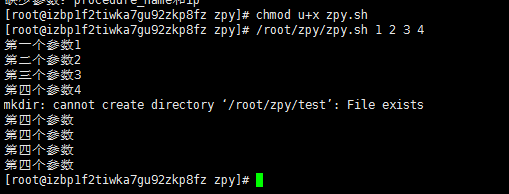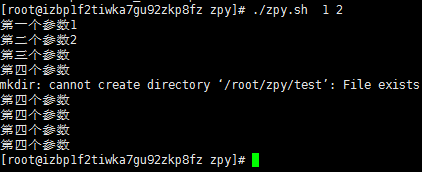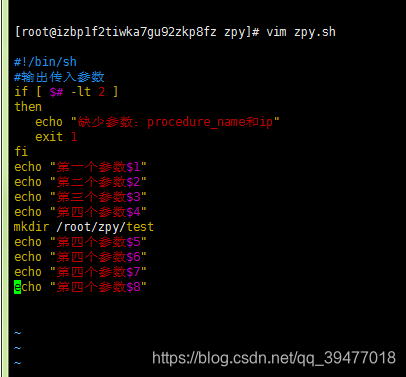linux 运行*.sh文件的方法:
在Linux系统下运行.sh文件有两种方法,比如我在root/zpy目录下有个zpy.sh文件
第一种(这种办法需要用chmod使得文件具备执行条件(x): chmod u+x zpy.sh):
1、在任何路径下,输入该文件的绝对路径/root/zpy/zpy.sh就可执行该文件(当然要在权限允许情况下)

2、cd到zpy.sh文件的目录下,然后执行./zpy.sh

第二种(这种办法不需要文件具备可执行的权限也可运行):
1、在该文件路径下sh加上文件名字即可,sh zpy.sh
2、在任意路径下,sh 加上文件路径及文件名称:sh /zpy/zpy.sh
java调用shell文件并且传入参数:
public static void invokeShell(){
//方法1 执行字符串命令(各个参数1234之间需要有空格)
String path="sh /root/zpy/zpy.sh 1 2 3 4";
//方法2 在单独的进程中执行指定命令和变量。
//第一个变量是sh命令,第二个变量是需要执行的脚本路径,从第三个变量开始是我们要传到脚本里的参数。
String[] path=new String[]{"sh","/root/zpy/zpy.sh","1","2","3","4"};
try{
Runtime runtime = Runtime.getRuntime();
Process pro = runtime.exec(path);
int status = pro.waitFor();
if (status != 0)
{
System.out.println("Failed to call shell's command");
}
BufferedReader br = new BufferedReader(new InputStreamReader(pro.getInputStream()));
StringBuffer strbr = new StringBuffer();
String line;
while ((line = br.readLine())!= null)
{
strbr.append(line).append("\n");
}
String result = strbr.toString();
System.out.println(result);
}
catch (IOException ec)
{
ec.printStackTrace();
}
catch (InterruptedException ex){
ex.printStackTrace();
}
}

zpy.sh 文件

根据需要调用不同的方法:
Process exec(String command)
在单独的进程中执行指定的字符串命令。
Process exec(String[] cmdarray)
在单独的进程中执行指定命令和变量。
Process exec(String[] cmdarray, String[] envp)
在指定环境的独立进程中执行指定命令和变量。
Process exec(String[] cmdarray, String[] envp, File dir)
在指定环境和工作目录的独立进程中执行指定的命令和变量。
Process exec(String command, String[] envp)
在指定环境的单独进程中执行指定的字符串命令。
Process exec(String command, String[] envp, File dir)
在有指定环境和工作目录的独立进程中执行指定的字符串命令。
调用远程的shell脚本:pom 添加jar包依赖
<!--调用远程服务器上的shell-->
<dependency>
<groupId>org.jvnet.hudson</groupId>
<artifactId>ganymed-ssh2</artifactId>
<version>build210-hudson-1</version>
</dependency>
/**
* 执行远程服务器上的shell脚本
* @param ip 服务器IP地址
* @param port 端口号
* @param name 登录用户名
* @param pwd 密码
* @param cmds shell命令
*/
public static void RemoteInvokeShell(String ip,int port,String name,String pwd,String cmds) {
Connection conn=null;
try {
conn = new Connection(ip,port);
conn.connect();
if (conn.authenticateWithPassword(name, pwd)) {
// Open a new {@link Session} on this connection
Session session = conn.openSession();
// Execute a command on the remote machine.
session.execCommand(cmds);
BufferedReader br = new BufferedReader(new InputStreamReader(session.getStdout()));
BufferedReader brErr = new BufferedReader(new InputStreamReader(session.getStderr()));
String line;
while ((line = br.readLine()) != null) {
logger.info("br={}", line);
}
while ((line = brErr.readLine()) != null) {
logger.info("brErr={}", line);
}
if (null != br) {
br.close();
}
if(null != brErr){
brErr.close();
}
session.waitForCondition(ChannelCondition.EXIT_STATUS, 0);
int ret = session.getExitStatus();
logger.info("getExitStatus:"+ ret);
} else {
logger.info("登录远程机器失败" + ip);
}
} catch (IOException e) {
e.printStackTrace();
} catch (Exception e) {
e.printStackTrace();
} finally {
if (conn != null) {
conn.close();
}
}
}
public static void main(String[] args){
RemoteInvokeShell("192.168.11.xx",22,"xx","xx","sh /root/zpy/zpy.sh \"jj|aa|bb\"")//带有特殊符号的参数需要加上双引号
}
我程序中使用的:
package com.witsky.util;
import ch.ethz.ssh2.ChannelCondition;
import ch.ethz.ssh2.Connection;
import ch.ethz.ssh2.SCPClient;
import ch.ethz.ssh2.Session;
import com.alibaba.fastjson.JSON;
import org.slf4j.Logger;
import org.slf4j.LoggerFactory;
import java.io.BufferedReader;
import java.io.File;
import java.io.IOException;
import java.io.InputStreamReader;
/**
* Created by Administrator on 2019/4/22.
*/
public class InvokeShell {
private static final Logger logger = LoggerFactory.getLogger(InvokeShell.class);
/**
* 调用shell脚本
* @param path
*/
public static void invokeShell(String [] path) {
logger.info("invoke shell:{}", JSON.toJSONString(path));
try {
Runtime runtime = Runtime.getRuntime();
Process pro = runtime.exec(path);
// int status = pro.waitFor();
// if (status != 0) {
// logger.info("Failed to call shell's command ");
// }
BufferedReader br = new BufferedReader(new InputStreamReader(pro.getInputStream()));
BufferedReader brErr = new BufferedReader(new InputStreamReader(pro.getErrorStream()));
String line;
while ((line = br.readLine()) != null) {
logger.info("br={}", line);
}
while ((line = brErr.readLine()) != null) {
logger.info("brErr={}", line);
}
if (null != br) {
br.close();
}
if(null != brErr){
brErr.close();
}
}catch (Exception e){
logger.error(e.getMessage(),e);
}
}
/**
* 执行远程服务器上的shell脚本
* @param ip 服务器IP地址
* @param port 端口号
* @param name 登录用户名
* @param pwd 密码
* @param cmds shell命令
*/
public static void RemoteInvokeShell(String ip,int port,String name,String pwd,String[] cmds) {
logger.info("ip:"+ip+" port:"+port+" name:"+name+" password:"+pwd);
StringBuffer cmd=new StringBuffer();
for(String s:cmds){
if(s.contains("|")||s.contains(" ")){ //如果包含特殊符号
s="\""+s+"\"";
}
cmd.append(s).append(" ");
}
String cmdd= cmd.toString();
//cmdd=cmdd.substring(0,cmdd.length()-1);
logger.info("invoke shell:{}",cmdd);
Connection conn=null;
try {
conn = new Connection(ip,port);
conn.connect();
if (conn.authenticateWithPassword(name, pwd)) {
// Open a new {@link Session} on this connection
Session session = conn.openSession();
// Execute a command on the remote machine.
session.execCommand(cmdd);
BufferedReader br = new BufferedReader(new InputStreamReader(session.getStdout()));
BufferedReader brErr = new BufferedReader(new InputStreamReader(session.getStderr()));
String line;
while ((line = br.readLine()) != null) {
logger.info("br={}", line);
}
while ((line = brErr.readLine()) != null) {
logger.info("brErr={}", line);
}
if (null != br) {
br.close();
}
if(null != brErr){
brErr.close();
}
session.waitForCondition(ChannelCondition.EXIT_STATUS, 0);
int ret = session.getExitStatus();
logger.info("getExitStatus:"+ ret);
} else {
logger.info("登录远程机器失败" + ip);
}
} catch (IOException e) {
e.printStackTrace();
} catch (Exception e) {
e.printStackTrace();
} finally {
if (conn != null) {
conn.close();
}
}
}
/**
* 上传文件到远程服务器
*/
public static void remoteUploadFile(String ip,int port,String name,String pwd,String filePath,String fileName,File file) {
logger.info("remoteUploadFile.... ");
Connection connection = new Connection(ip,port);
try {
connection.connect();
boolean isAuthenticated = connection.authenticateWithPassword(name,pwd);
if(!isAuthenticated){
logger.info("登录远程机器失败" + ip);
return ;
}
SCPClient scpClient = new SCPClient(connection);
scpClient.put(filePath+fileName, filePath);
if(null!=connection){
connection.close();
}
logger.info("upload ok");
} catch (IOException e) {
e.printStackTrace();
}
}
public static void main(String[] args){
//调用脚本
String path[]={"sh","/root/zpy/import_checkline.sh",//shell脚本的存放路径
"--shp","aaa|bbb|ccc",//"--shp"代表的是shell脚本里面的参数名 aaa|bbb|ccc 代表参数值
"--dbf","dddd",
"--location-info","",
"--check-line-geo","T_CHECKLINE_SUB_INFO",
"--project-id","",
"--check-line-station","T_CHECKLINE_LACCI",
"--check-line-info-name","T_CHECKLINE_INFO",
"--import-info-name","T_IMPORT_TASK",
"--abs-distance","",
"--buffer-distance","",
"--max-length","",
"--max-related-distance","",
"--import-task-id","",
"--check-line-id","",
"--db-info",""
};
RemoteInvokeShell("ip",123,"name","ppwd",path);//远程调用
invokeShell(path);//本机调用
}
}
问我shell脚本怎么写的,emmmm这个我也不太懂,是我们数据库dba写的,贴一份你们自己看看叭
#!/bin/bash
source /etc/profile
source ~/.bash_profile
###########################################################################
# SCRIPT: import_checkline.sh
# AUTHOR: YEKS
# DATE : 2019-4-06
# REV : 1.0.A
# (Valid are A, B, D, T and P)
# (For Alpha, Beta, Dev, Test and Production)
#
# PLATFORM: Linux
#
# PURPOSE:
# --shp
# --dbf
# --location-info
# --check-line-geo
# --project-id
# --check-line-station
# --abs-distance
# --buffer-distance
# --max-length
# --max-related-distance
# --check-line-info-name
# --import-info-name
# --import-task-id
# --check-line-id
#
# REV LIST:
#
#
#
#
###########################################################################
###########################################################################
# DEFINE FILES AND VARIABLES HERE
###########################################################################
# The Program Path
WORK_DIR=/home/sms/scripts
# The Log Path
LOG_DIR=$WORK_DIR/log
# Lock Path
LCK_DIR=$WORK_DIR/lck
# The Program Name
progname=dispatch
# Parameter Virables
while getopts ":-:" opt
do
case $opt in
-)
case "${OPTARG}" in
shp)
shp="${!OPTIND}"; OPTIND=$(( $OPTIND + 1 ))
;;
shp=*)
shp=${OPTARG#*=}
;;
dbf)
dbf="${!OPTIND}"; OPTIND=$(( $OPTIND + 1 ))
;;
dbf=*)
dbf=${OPTARG#*=}
;;
location-info)
locationinfo="${!OPTIND}"; OPTIND=$(( $OPTIND + 1 ))
;;
location-info=*)
locationinfo=${OPTARG#*=}
;;
check-line-geo)
checklinegeo="${!OPTIND}"; OPTIND=$(( $OPTIND + 1 ))
;;
check-line-geo=*)
checklinegeo=${OPTARG#*=}
;;
project-id)
projectId="${!OPTIND}"; OPTIND=$(( $OPTIND + 1 ))
;;
project-id=*)
projectId=${OPTARG#*=}
;;
check-line-station)
checklinestation="${!OPTIND}"; OPTIND=$(( $OPTIND + 1 ))
;;
check-line-station=*)
checklinestation=${OPTARG#*=}
;;
abs-distance)
absdistance="${!OPTIND}"; OPTIND=$(( $OPTIND + 1 ))
;;
abs-distance=*)
absdistance=${OPTARG#*=}
;;
buffer-distance)
bufferdistance="${!OPTIND}"; OPTIND=$(( $OPTIND + 1 ))
;;
buffer-distance=*)
bufferdistance=${OPTARG#*=}
;;
max-length)
maxlength="${!OPTIND}"; OPTIND=$(( $OPTIND + 1 ))
;;
max-length=*)
maxlength=${OPTARG#*=}
;;
max-related-distance)
maxrelateddistance="${!OPTIND}"; OPTIND=$(( $OPTIND + 1 ))
;;
max-related-distance=*)
maxrelateddistance=${OPTARG#*=}
;;
check-line-info-name)
checklineinfoname="${!OPTIND}"; OPTIND=$(( $OPTIND + 1 ))
;;
check-line-info-name=*)
checklineinfoname=${OPTARG#*=}
;;
check-line-id)
checklineid="${!OPTIND}"; OPTIND=$(( $OPTIND + 1 ))
;;
check-line-id=*)
checklineid=${OPTARG#*=}
;;
import-info-name)
importinfoname="${!OPTIND}"; OPTIND=$(( $OPTIND + 1 ))
;;
import-info-name=*)
importinfoname=${OPTARG#*=}
;;
import-task-id)
taskid="${!OPTIND}"; OPTIND=$(( $OPTIND + 1 ))
;;
import-task-id=*)
taskid=${OPTARG#*=}
;;
db-info)
dbinfo="${!OPTIND}"; OPTIND=$(( $OPTIND + 1 ))
;;
db-info=*)
dbinfo=${OPTARG#*=}
;;
*)
;;
esac;;
?)
echo "usage: $0 [--shp --dbf --location-info --check-line-geo --check-line-id --project-id --check-line-station --abs-distance --buffer-distance --max-length --max-related-distance --check-line-info-name --import-info-name --import-task-id --db-info ]"
exit 1
;;
esac
done
if [[ -z $taskid && -z $inputfiledir && -z $outputfiledir ]]; then
echo "usage: $0 [--shp --dbf --location-info --check-line-geo --check-line-id --project-id --check-line-station --abs-distance --buffer-distance --max-length --max-related-distance --check-line-info-name --import-info-name --import-task-id --db-info ]"
exit 1
fi
# The Database Path
export NLS_LANG="American_America.ZHS16GBK"
export LANG="zh_CN.GBK"
export ORACLE_HOME=/u01/app/oracle/product/12.1.0.2/client_1
ORA_SID=dev
ORA_USER=jtgl
ORA_PASS=czty_jtgl
###########################################################################
# DEFINE FUNCTION HERE
###########################################################################
if [[ ! -d $LOG_DIR ]]; then
mkdir -p $LOG_DIR
fi
if [[ ! -d $LCK_DIR ]]; then
mkdir -p $LCK_DIR
fi
prog(){
sid=$$
dt=`date +"%Y%m%d%H%M%S"`
flag=`ls -la $LOG_DIR | grep "${taskid}_checkline_" | wc -l`
if [[ "$flag" == "0" ]]; then
>> $LOG_DIR/${taskid}_checkline_${dt}.log
nohup $WORK_DIR/checkline/checkline --shp=$shp --dbf=$dbf --location-info=$locationinfo --check-line-geo=$checklinegeo --project-id=$projectId \
--check-line-station=$checklinestation --abs-distance=$absdistance --buffer-distance=$bufferdistance --max-length=$maxlength \
--max-related-distance=$maxrelateddistance --check-line-info-name=$checklineinfoname --import-info-name=$importinfoname \
--import-task-id=$taskid --check-line-id=$checklineid --db-info=$dbinfo >> $LOG_DIR/${taskid}_checkline_${dt}.log
fi
exit 0
}
###########################################################################
# BEGINNING OF MAIN
###########################################################################
prog










 本文介绍在Linux环境下如何运行和调用Shell脚本文件,并通过Java程序实现本地和远程调用,包括参数传递和错误处理。
本文介绍在Linux环境下如何运行和调用Shell脚本文件,并通过Java程序实现本地和远程调用,包括参数传递和错误处理。
















 778
778

 被折叠的 条评论
为什么被折叠?
被折叠的 条评论
为什么被折叠?








